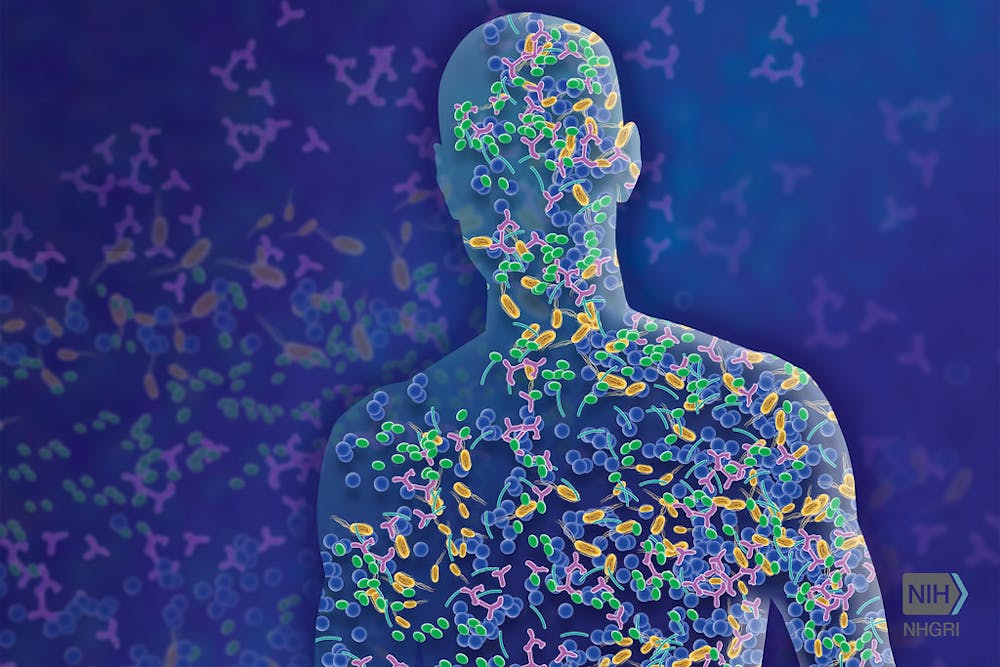Imagine a bustling metropolis on a weekday morning: vehicles honking, people rushing to work, street vendors setting up shop and delivery trucks weaving through the chaos. Despite the apparent asynchrony, there is order to this chaos. Now, if we shrink this scene down to the microscopic level, we zoom into another bustling system: the human gut microbiome. This is a dynamic and complex ecosystem teeming with trillions of microorganisms checking their own to-do lists to keep us alive.
Nestled in a pocket in the large intestine called the cecum, the human gut microbiome is composed of bacteria, viruses, fungi and other microbes. This microbial community is believed to be so essential that it has been knighted as a supporting organ. In fact, the number of bacterial cells (around 40 trillion) in the body far surpasses human cells (30 trillion), and these microbes collectively weigh two to five pounds.
The diverse microbial species of the gut microbiome are akin to essential workers fulfilling different roles — in digestion, immunity and even neurological functions. Bacteria such as Bifidobacteria are crucial at birth, breaking down health sugars in breast milk to promote infant growth.
As we mature, these gut bacteria support the digestion of complex carbohydrates — particularly fiber — which human digestive enzymes cannot break down. The fermentation of fiber by gut bacteria produces short-chain fatty acids (SCFAs) like butyrate, acetate and propionate. These contribute to gut health, muscle function and potentially even chronic disease prevention. SCFAs have also been linked to reduced risks of obesity, diabetes and cardiovascular disease.
Moreover, the gut microbiome is a vital regulator of the immune system by its interacting with immune cells and influencing how the body responds to infections and external threats. Beneficial bacteria can outcompete harmful pathogens for space and nutrients, preventing their overgrowth. Additionally, the gut’s mucosal lining serves as a major site for immune activity, producing antimicrobial proteins that help maintain microbial balance.
Emerging research suggests that the gut microbiome extends its influence beyond the digestive and immune systems, playing a role in brain function. This gut-brain connection is mediated through the vagus nerve and biochemical signals, including neurotransmitters such as serotonin and dopamine, which affect mood and cognition. Dysbiosis, an imbalance in gut bacteria, has been linked to conditions such as anxiety, depression and neurodegenerative diseases.
When pathogenic bacteria outnumber beneficial microbes, an imbalance known as dysbiosis occurs, disrupting homeostasis and potentially leading to health issues. Dysbiosis has been associated with various conditions including metabolic disorders, autoimmune diseases and gastrointestinal afflictions.
Studies show that microbiome composition can influence weight gain. In a study, microbiota from an obese twin were transplanted into mice, leading them to gain more weight than mice that received microbiota from the lean twin, despite identical diets.
SCFAs produced by gut bacteria are crucial in protecting against inflammatory bowel diseases such as Crohn’s disease and ulcerative colitis. A microbial imbalance can lead to reduced SCFA levels, potentially exacerbating these conditions.
Diet can be one of the most powerful ways to prevent gut dysbiosis. A high-fiber diet fosters the growth of beneficial bacteria, which, in turn, enhances SCFA production. Foods rich in fiber — such as whole grains, legumes, fruits and vegetables — act as prebiotics, substances that feed beneficial bacteria. Additionally, fermented foods like yogurt, kimchi, sauerkraut and kefir contain probiotics, live beneficial bacteria that contribute to microbial balance.
Probiotics can effectively restore gut microbiome equilibrium after disruptions like antibiotic use, which can indiscriminately kill both harmful and beneficial bacteria. Research suggests that probiotics may help reduce the severity of diarrhea caused by infections and antibiotics while also replenishing normal gut flora.
Scientific advancements are now exploring microbiome manipulation as a therapeutic avenue. Fecal microbiota transplantation (FMT), where a healthy donor’s microbiota is transplanted into a patient, has shown remarkable success in treating Clostridium difficile infections. Additionally, synthetic biologists are investigating ways to engineer specific bacterial strains to enhance their health-promoting properties.
As research on the microbiome progresses, scientists are beginning to explore its potential applications in personalized medicine. By analyzing microbiome composition, early signs of diseases like diabetes and cancer can be detected before symptoms appear. We can also attempt to modify microbial ecosystems at an individual-species level to combat disease. Lastly, identifying variations in microbial composition between healthy individuals and those with conditions such as obesity, cardiovascular disease and gastrointestinal disorders can reveal novel insights.
Your gut is more than just an organ; it’s a dynamic ecosystem of microbes shaping your health in ways we are only beginning to understand. From digestion to immunity and even brain function, these tiny allies play a crucial role. Supporting them with fiber-rich and probiotic foods isn’t just about better digestion; it’s about sustaining an internal balance that affects your entire well-being. As research advances, microbiome-targeted therapies may redefine medicine, proving that the key to future health might lie within us all along.





